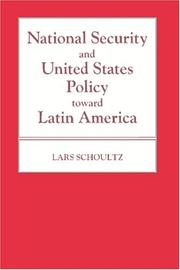| Listing 1 - 10 of 13 | << page >> |
Sort by
|
Book
ISBN: 1400854296 0691614822 0691022046 9781400854295 Year: 1981 Publisher: Princeton Princeton University Press
Abstract | Keywords | Export | Availability | Bookmark
 Loading...
Loading...Choose an application
- Reference Manager
- EndNote
- RefWorks (Direct export to RefWorks)
The role of human rights in United States policy toward Latin America is the subject of this study. It covers the early sixties to 1980, a period when humanitarian values came to play an important role in determining United States foreign policy. The author is concerned both with explaining why these values came to impinge on government decision making and how internal bureaucratic processes affected the specific content of United States policy.Originally published in 1981.The Princeton Legacy Library uses the latest print-on-demand technology to again make available previously out-of-print books from the distinguished backlist of Princeton University Press. These editions preserve the original texts of these important books while presenting them in durable paperback and hardcover editions. The goal of the Princeton Legacy Library is to vastly increase access to the rich scholarly heritage found in the thousands of books published by Princeton University Press since its founding in 1905.
Civil rights -- Latin America. --- Human rights -- Latin America. --- Latin America -- Relations -- United States. --- United States -- Foreign relations -- 1945-1989. --- United States -- Relations -- Latin America. --- Civil rights --- Human rights --- Regions & Countries - Americas --- History & Archaeology --- Latin America --- Relations --- United States --- Foreign relations --- 1945-1989

ISBN: 069107741X 0691022674 0691609632 1400858496 9780691077413 9780691022673 Year: 1987 Publisher: Princeton (N.J.): Princeton university press,
Abstract | Keywords | Export | Availability | Bookmark
 Loading...
Loading...Choose an application
- Reference Manager
- EndNote
- RefWorks (Direct export to RefWorks)
Lars Schoultz proposes a way for all those interested in U.S. foreign policy fully to appreciate the terms of the present debate. To understand U.S. policy in Latin America, he contends, one must critically examine the deeply held beliefs of U.S. policy makers about what Latin America means to U.S. national security.Originally published in 1987.The Princeton Legacy Library uses the latest print-on-demand technology to again make available previously out-of-print books from the distinguished backlist of Princeton University Press. These editions preserve the original texts of these important books while presenting them in durable paperback and hardcover editions. The goal of the Princeton Legacy Library is to vastly increase access to the rich scholarly heritage found in the thousands of books published by Princeton University Press since its founding in 1905.
National security --- Latin America --- United States --- Strategic aspects --- Military relations --- Homeland defense --- Homeland security --- Asociación Latinoamericana de Libre Comercio countries --- Neotropical region --- Neotropics --- New World tropics --- Spanish America --- ABŞ --- ABSh --- Ameerika Ühendriigid --- America (Republic) --- Amerika Birlăshmish Shtatlary --- Amerika Birlăşmi Ştatları --- Amerika Birlăşmiş Ştatları --- Amerika ka Kelenyalen Jamanaw --- Amerika Qūrama Shtattary --- Amerika Qŭshma Shtatlari --- Amerika Qushma Shtattary --- Amerika (Republic) --- Amerikai Egyesült Államok --- Amerikanʹ Veĭtʹsėndi︠a︡vks Shtattnė --- Amerikări Pĕrleshu̇llĕ Shtatsem --- Amerikas Forenede Stater --- Amerikayi Miatsʻyal Nahangner --- Ameriketako Estatu Batuak --- Amirika Carékat --- AQSh --- Ar. ha-B. --- Arhab --- Artsot ha-Berit --- Artzois Ha'bris --- Bí-kok --- Ē.P.A. --- EE.UU. --- Egyesült Államok --- ĒPA --- Estados Unidos --- Estados Unidos da América do Norte --- Estados Unidos de América --- Estaos Xuníos --- Estaos Xuníos d'América --- Estatos Unitos --- Estatos Unitos d'America --- Estats Units d'Amèrica --- Ètats-Unis d'Amèrica --- États-Unis d'Amérique --- Fareyniḳṭe Shṭaṭn --- Feriene Steaten --- Feriene Steaten fan Amearika --- Forente stater --- FS --- Hēnomenai Politeiai Amerikēs --- Hēnōmenes Politeies tēs Amerikēs --- Hiwsisayin Amerikayi Miatsʻeal Tērutʻiwnkʻ --- Istadus Unidus --- Jungtinės Amerikos valstybės --- Mei guo --- Mei-kuo --- Meiguo --- Mî-koet --- Miatsʻyal Nahangner --- Miguk --- Na Stàitean Aonaichte --- NSA --- S.U.A. --- SAD --- Saharat ʻAmērikā --- SASht --- Severo-Amerikanskie Shtaty --- Severo-Amerikanskie Soedinennye Shtaty --- Si︠e︡vero-Amerikanskīe Soedinennye Shtaty --- Sjedinjene Američke Države --- Soedinennye Shtaty Ameriki --- Soedinennye Shtaty Severnoĭ Ameriki --- Soedinennye Shtaty Si︠e︡vernoĭ Ameriki --- Spojené obce severoamerické --- Spojené staty americké --- SShA --- Stadoù-Unanet Amerika --- Stáit Aontaithe Mheiriceá --- Stany Zjednoczone --- Stati Uniti --- Stati Uniti d'America --- Stâts Unîts --- Stâts Unîts di Americhe --- Steatyn Unnaneysit --- Steatyn Unnaneysit America --- SUA (Stati Uniti d'America) --- Sŭedineni amerikanski shtati --- Sŭedinenite shtati --- Tetã peteĩ reko Amérikagua --- U.S. --- U.S.A. --- United States of America --- Unol Daleithiau --- Unol Daleithiau America --- Unuiĝintaj Ŝtatoj de Ameriko --- US --- USA --- Usono --- Vaeinigte Staatn --- Vaeinigte Staatn vo Amerika --- Vereinigte Staaten --- Vereinigte Staaten von Amerika --- Verenigde State van Amerika --- Verenigde Staten --- VS --- VSA --- Wááshindoon Bikéyah Ałhidadiidzooígíí --- Wilāyāt al-Muttaḥidah --- Wilāyāt al-Muttaḥidah al-Amirīkīyah --- Wilāyāt al-Muttaḥidah al-Amrīkīyah --- Yhdysvallat --- Yunaeted Stet --- Yunaeted Stet blong Amerika --- ZDA --- Združene države Amerike --- Zʹi︠e︡dnani Derz︠h︡avy Ameryky --- Zjadnośone staty Ameriki --- Zluchanyi︠a︡ Shtaty Ameryki --- Zlucheni Derz︠h︡avy --- ZSA --- Η.Π.Α. --- Ηνωμένες Πολιτείες της Αμερικής --- Америка (Republic) --- Американь Вейтьсэндявкс Штаттнэ --- Америкӑри Пӗрлешӳллӗ Штатсем --- САЩ --- Съединените щати --- Злучаныя Штаты Амерыкі --- ولايات المتحدة --- ولايات المتّحدة الأمريكيّة --- ولايات المتحدة الامريكية --- 미국 --- Strategic aspects. --- États-Unis --- É.-U. --- ÉU --- National security - United States --- Latin America - Strategic aspects --- United States - Military relations - Latin America --- Latin America - Military relations - United States
Book
ISBN: 1469603446 0807888605 9780807888605 9781469603445 080783260X 9780807832608 9780807832608 Year: 2009 Publisher: Chapel Hill University of North Carolina Press
Abstract | Keywords | Export | Availability | Bookmark
 Loading...
Loading...Choose an application
- Reference Manager
- EndNote
- RefWorks (Direct export to RefWorks)
"Cuba has regularly given Washington a headache, Lars Schoultz observes in his comprehensive chronicle of U.S. policy toward the Cuban Revolution. Seeking relief, even the most patient U.S. officials have often been tempted to repeat what an exasperated President Theodore Roosevelt told a friend in 1906: "I am so angry with that infernal little Cuban republic that I would like to wipe its people off the face of the earth."" "Certainly that has been true since 1959, when a group of rebels led by Fidel Castro ousted Fulgencio Batista, a dictator known for his friendly ties to the United States, and proceeded to cause more trouble than anyone could have imagined. Using a rich array of documents and firsthand interviews with U.S. and Cuban officials, Schoultz tells the story of the attempts and failures of ten U.S. administrations to end the Cuban Revolution. He covers everything from the legendary 1960s plot to assassinate Castro using a rigged ballpoint pen to the message that recently ran across the electronic billboard of the U.S. interests section in Havana: "Communism doesnt work because people like to own stuff" - a comment attributed to the late rocker Frank Zappa. Schoultz argues that despite the overwhelming advantage in size and power that the United States enjoys over its neighbor, the Cubans' historical insistence on their right to self-determination has inevitably irritated American administrations, influenced both U.S. domestic politics and foreign policy, and led to a freeze in diplomatic relations of unprecedented longevity. Schoultz's analysis illuminates what has been a highly unproductive foreign policy and points to fresh prospects as a new century of U.S.-Cuban relations begins."--BOOK JACKET.
Presidents --- History --- Cuba --- United States --- Politics and government --- Foreign relations --- Présidents --- Histoire --- Etats-Unis --- Relations extérieures --- Politique et gouvernement
Book
ISBN: 067498899X 0674989015 9780674989016 9780674984141 0674984145 Year: 2018 Publisher: Cambridge, Massachusetts Harvard University Press
Abstract | Keywords | Export | Availability | Bookmark
 Loading...
Loading...Choose an application
- Reference Manager
- EndNote
- RefWorks (Direct export to RefWorks)
In this book, Lars Schoultz explores the culture of "improvement" that defines the attitudes and values shaping all United States policies towards Latin America in the past and present. Schoultz's aim is to find the sources of this political and intellectual culture which has informed our relations with our southern neighbors and which continues to do so despite its faulty premises and its failure to effect change and transformation. Schoultz focuses on two period in the past as critical to embedding the culture and policies of improvement: the Progressive Era, which established the belief in "uplifting" others for their betterment, and the Cold War Era, which established the institutions for sustaining and implementing the process of uplifting a people and state. In Their Own Best Interest: A History of the U.S. Effort to Improve Latin Americans is a powerful historical indictment of a "constellation of beliefs" that has been a central part of Washington's foreign policy establishment and culture. The notion that the United States knows better than its allies and neighbors what is best for each of them resonates beyond Latin America and underlies much of the United States' foreign policies around the world.--
Politicians --- Economic assistance, American --- Progressivism (United States politics) --- Attitudes. --- History. --- United States --- Latin America --- Foreign relations --- Moral and ethical aspects. --- Philosophy. --- Central America. --- Chile. --- Cuba. --- Dominican Republic. --- Foreign aid. --- Good Neighbor policy. --- Latin American economy. --- Latin American politics. --- Mexico. --- U.S. investments in Latin America. --- USAID. --- military assistance in Latin America.

ISBN: 067492276X Year: 1998 Publisher: Cambridge, Mass. London Harvard University Press
Abstract | Keywords | Export | Availability | Bookmark
 Loading...
Loading...Choose an application
- Reference Manager
- EndNote
- RefWorks (Direct export to RefWorks)
Book
ISBN: 9780674043282 Year: 2022 Publisher: Cambridge, MA
Abstract | Keywords | Export | Availability | Bookmark
 Loading...
Loading...Choose an application
- Reference Manager
- EndNote
- RefWorks (Direct export to RefWorks)
Book
ISBN: 9781400858491 Year: 2014 Publisher: Princeton, NJ
Abstract | Keywords | Export | Availability | Bookmark
 Loading...
Loading...Choose an application
- Reference Manager
- EndNote
- RefWorks (Direct export to RefWorks)
Digital
ISBN: 9780674043282 Year: 2022 Publisher: Cambridge, Mass. Harvard University Press
Abstract | Keywords | Export | Availability | Bookmark
 Loading...
Loading...Choose an application
- Reference Manager
- EndNote
- RefWorks (Direct export to RefWorks)
Digital
ISBN: 9781400854295 9780691614823 Year: 2014 Publisher: Princeton, N.J. Princeton University Press
Abstract | Keywords | Export | Availability | Bookmark
 Loading...
Loading...Choose an application
- Reference Manager
- EndNote
- RefWorks (Direct export to RefWorks)
Multi
ISBN: 9781400858491 9780691609638 Year: 2014 Publisher: Princeton, N.J. Princeton University Press
Abstract | Keywords | Export | Availability | Bookmark
 Loading...
Loading...Choose an application
- Reference Manager
- EndNote
- RefWorks (Direct export to RefWorks)
| Listing 1 - 10 of 13 | << page >> |
Sort by
|

 Search
Search Feedback
Feedback About UniCat
About UniCat  Help
Help News
News